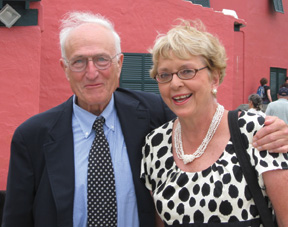DEGREE: B.A. in history; M.B.A. in transportation from American University
JOB TITLE: Published writer, student, and train enthusiast; recently featured in Trains Magazine for documenting his experience as a summer intern for the Pennsylvania Railroad while he was a student at Trinity
FAVORITE TRINITY MEMORY: I have fond memories of being involved in many activities. I swam, won my weight class (155 lb.) in intramural wrestling, and played soccer for four years – one year we won an NCAA national championship. I was treasurer of Delta Phi, made Pi Gamma Mu, was on the Freshman Executive Council, and was a junior adviser to incoming freshmen. Those all felt like real accomplishments.
REPORTER: How did your lifelong fascination with trains begin?
NORRIS: It started when I was about four years old. I couldn’t get enough of listening to the trains that went by on the Western Maryland Railroad, which is now part of CSX. That is when the enthusiasm started, and it is why I was so excited when the Pennsylvania Railroad (PRR) was represented at Trinity’s career day in the spring of 1957. The PRR was the largest railroad in the world at one point. It stretched from the East Coast to the Midwest, and in the 1920s it had a payroll greater than the federal government. They were looking for seniors, but my railroading fascination was so great that the Pennsy’s personnel department gave me a summer job.
REPORTER: What kinds of things did you do during that summer?
NORRIS: I was called a transportation inspector, but in essence I was a summer intern. The corporation was furloughing people when I arrived in Indiana, but somehow they kept me on the payroll. Each week I would get a different assignment. One week I would be in St. Louis, another week in Louisville, and another week in Indianapolis. I was doing every conceivable job on the railroad that you could have. I had fraternity brothers located throughout the geographical area, so I would visit them during my travels. I had great adventures. I liken my experiences to that of Holden Caulfield in The Catcher in the Rye, though his were negative and mine were positive.
REPORTER: What prompted you to keep the diary of your experiences?
NORRIS: I attribute that to my education at Trinity. My mind had been trained academically to know that I should start keeping thorough notes. I knew I had to get on paper all of my experiences, like riding a freight train, having an engine pass, and the sights and smells. Because of the narratives in my diary, I remember every moment of that summer, and it has also become a valuable addition to the world-renowned Railroad Museum of Pennsylvania archives.
REPORTER: What makes the diary an important original historical source document from the time?
NORRIS: It has information from an individual’s perspective at a specific time period. For example, I took detailed notes of things like railroad business car menus, recorded things that people said, discussed my daily activities, and critically assessed my surroundings. My book actually prophesized the ultimate decline of the Pennsylvania Railroad! What is remarkable is that the diary survived twelve moves, starting with coming back home after my summer internship and sitting here in my desk in Westminster, MD, for many years. If I had not gone back to college in 2009, I suspect the book would have been thrown in the trash.
REPORTER: Why did you go back to school, and what are you studying?
NORRIS: In 2009, I went to visit a senior citizen center, and I thought, “Oh no – is this me for the rest of my life?” So I started taking courses at Carroll Community College in Maryland, everything from British literature, performing arts, psychology, and philosophy. I started writing again and renewed my interest in historical research. I put together a 47-page book about my father, who fought in World War I, after finding his draft card from 1917 on the Internet. With the help of Dr. Robert Young, a professor of mine, I approached the Maryland Historical Society about two publications: Trains Magazine with the story behind the 1957 diary, and American University with an important 1964 civil rights study that I published.
REPORTER: What do these accomplishments mean to you?
NORRIS: I am so happy to bring recognition to Trinity through a national publication like Trains Magazine. The fact that I have an enthusiasm for learning after all of these years is really a testament to the education I received at Trinity. Since college, I served in the Army, owned two businesses, and enjoyed my family – my wife of 53 years, Anne, two married children, and five grandchildren. But now, at the age of 77, I still find myself involved in so many rewarding activities.
I really want to be an example to older people that senior citizens can be viable and contribute to society. Since 2009, I have contributed five publications to six libraries, appeared in eight newspapers (including The Baltimore Sun), and written 15 Letters to the Editor at the Carroll County Times. Also I donated my diary to the Railroad Museum of Pennsylvania, and it was described by the staff as one of the most important original historical source documents that the museum has ever received. It just goes to show that, regardless of age, education keeps the gray cells active and productive.

